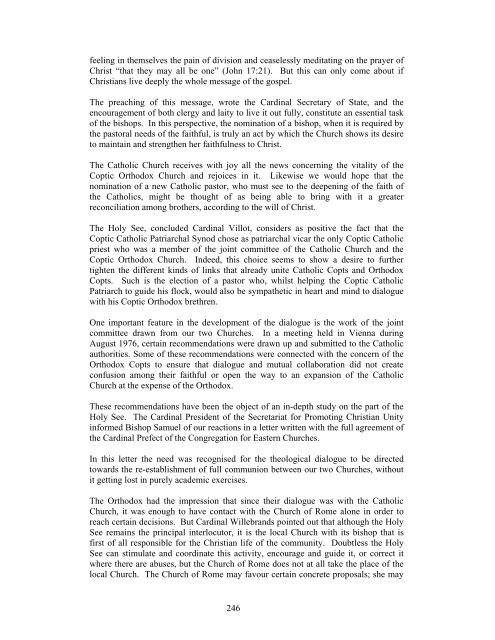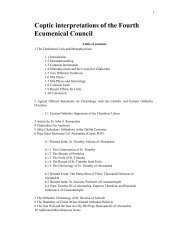Coptic Church & Ecumenical Movement - Saint Mina Coptic ...
Coptic Church & Ecumenical Movement - Saint Mina Coptic ...
Coptic Church & Ecumenical Movement - Saint Mina Coptic ...
You also want an ePaper? Increase the reach of your titles
YUMPU automatically turns print PDFs into web optimized ePapers that Google loves.
feeling in themselves the pain of division and ceaselessly meditating on the prayer of<br />
Christ “that they may all be one” (John 17:21). But this can only come about if<br />
Christians live deeply the whole message of the gospel.<br />
The preaching of this message, wrote the Cardinal Secretary of State, and the<br />
encouragement of both clergy and laity to live it out fully, constitute an essential task<br />
of the bishops. In this perspective, the nomination of a bishop, when it is required by<br />
the pastoral needs of the faithful, is truly an act by which the <strong>Church</strong> shows its desire<br />
to maintain and strengthen her faithfulness to Christ.<br />
The Catholic <strong>Church</strong> receives with joy all the news concerning the vitality of the<br />
<strong>Coptic</strong> Orthodox <strong>Church</strong> and rejoices in it. Likewise we would hope that the<br />
nomination of a new Catholic pastor, who must see to the deepening of the faith of<br />
the Catholics, might be thought of as being able to bring with it a greater<br />
reconciliation among brothers, according to the will of Christ.<br />
The Holy See, concluded Cardinal Villot, considers as positive the fact that the<br />
<strong>Coptic</strong> Catholic Patriarchal Synod chose as patriarchal vicar the only <strong>Coptic</strong> Catholic<br />
priest who was a member of the joint committee of the Catholic <strong>Church</strong> and the<br />
<strong>Coptic</strong> Orthodox <strong>Church</strong>. Indeed, this choice seems to show a desire to further<br />
tighten the different kinds of links that already unite Catholic Copts and Orthodox<br />
Copts. Such is the election of a pastor who, whilst helping the <strong>Coptic</strong> Catholic<br />
Patriarch to guide his flock, would also be sympathetic in heart and mind to dialogue<br />
with his <strong>Coptic</strong> Orthodox brethren.<br />
One important feature in the development of the dialogue is the work of the joint<br />
committee drawn from our two <strong>Church</strong>es. In a meeting held in Vienna during<br />
August 1976, certain recommendations were drawn up and submitted to the Catholic<br />
authorities. Some of these recommendations were connected with the concern of the<br />
Orthodox Copts to ensure that dialogue and mutual collaboration did not create<br />
confusion among their faithful or open the way to an expansion of the Catholic<br />
<strong>Church</strong> at the expense of the Orthodox.<br />
These recommendations have been the object of an in-depth study on the part of the<br />
Holy See. The Cardinal President of the Secretariat for Promoting Christian Unity<br />
informed Bishop Samuel of our reactions in a letter written with the full agreement of<br />
the Cardinal Prefect of the Congregation for Eastern <strong>Church</strong>es.<br />
In this letter the need was recognised for the theological dialogue to be directed<br />
towards the re-establishment of full communion between our two <strong>Church</strong>es, without<br />
it getting lost in purely academic exercises.<br />
The Orthodox had the impression that since their dialogue was with the Catholic<br />
<strong>Church</strong>, it was enough to have contact with the <strong>Church</strong> of Rome alone in order to<br />
reach certain decisions. But Cardinal Willebrands pointed out that although the Holy<br />
See remains the principal interlocutor, it is the local <strong>Church</strong> with its bishop that is<br />
first of all responsible for the Christian life of the community. Doubtless the Holy<br />
See can stimulate and coordinate this activity, encourage and guide it, or correct it<br />
where there are abuses, but the <strong>Church</strong> of Rome does not at all take the place of the<br />
local <strong>Church</strong>. The <strong>Church</strong> of Rome may favour certain concrete proposals; she may<br />
246








